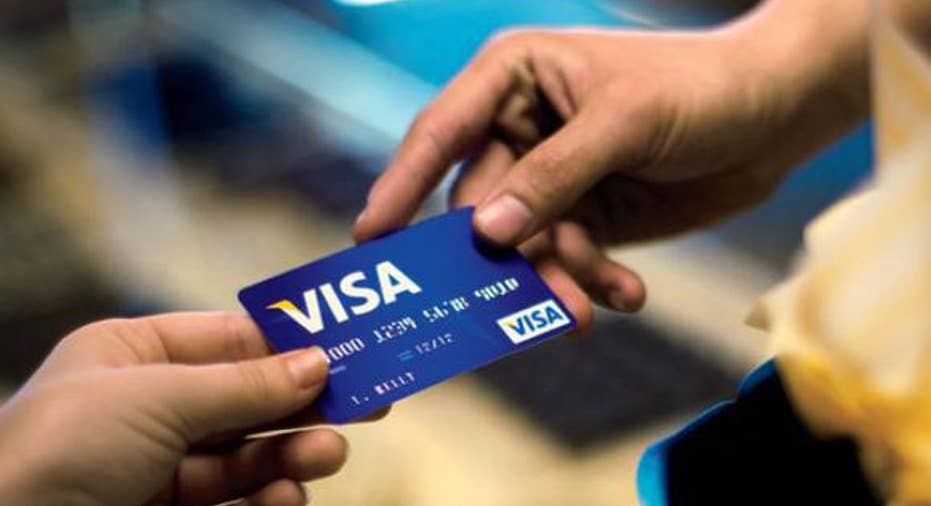Visa: 5 Fun Facts You Ought to Know

Image: Visa.
For years, Visa has sat atop the credit card industry, with its huge payment network spanning the globe and taking advantage of the increased use of electronic-payment networks to conduct business rather than cash transactions. Yet there are things about Visa that many investors don't know about and find surprising when they learn about them. Let's take a look at some fun facts about Visa that fly beneath the radar for many shareholders and cardholders.
Visa started as a Bank of America project The Visa card dates back to the mid-1970s, but its historical predecessor was the BankAmericard product from Bank of America . In 1958, Bank of America worked to develop its universal credit card, distinguishing it from the merchant-specific store cards that dominated the industry landscape in the 1950s. The first BankAmericard actually came in the form of a paper card and came with a $300 credit limit.
By 1970, Bank of America had turned over control of BankAmericard to issuing banks, but B of A kept the international rights to license the card outside the U.S. That decision helped extend BankAmericard into a global brand, as B of A brought in partners in more than a dozen countries.
The Visa nameThe global expansion of the BankAmericard program led to some concerns about logistics and brand consistency. In other parts of the world, the card carried other names, including Carte Bleue in France, Barclaycard in the U.K., and Chargex in Canada. Having a single network with a single name would not only boost brand awareness but also potentially help internal operations by bringing together interchange transaction processing and other key functions.
In 1976, BankAmericard became Visa. The company describes Visa as "a simple name that sounds the same in every language," with the obvious U.S. implications of being a payment method that would work around the world.
Nearly 30 years of ubiquityAdvertising slogans come and go, with many major companies discarding successful campaigns in favor of new efforts within just a few years. Visa's slogan distinguishes itself as having withstood the test of time.
In 1986, Visa began its "Everywhere You Want to Be" campaign, with the goal of extending the brand's image beyond the travel and business world to an all-purpose consumer credit card. Indeed, the company has consistently used the slogan as a way of poking fun at American Express , in conjunction with its exclusive marketing arrangements with key venues to accept only Visa cards for payment.
The Visa IPOUntil early 2008, Visa was owned by its member financial institutions. The IPO was a huge success, becoming the largest in history at that time at $17.9 billion. It also proved opportune as many Visa owners needed liquidity in the run-up to the then-looming financial crisis.
Even now, many banks have still held onto their Visa shares. For some, their Visa holdings have become a financial reserve account, with banks selling shares when tough times make it hard to tap other sources of liquidity. Bank of America, for instance, made sales of Visa shares from 2010 to 2014 as part of a broader plan to raise capital. Other banks have used sales to offset one-time charges to earnings. All told, banks still retain about $30 billion in Visa shares.
2,442,000,000 cards and countingVisa doesn't issue its own cards, but the number of cards bearing its name is truly astounding. As of the end of the most recent quarter, Visa had 2.442 billion credit and debit cards, with the U.S. alone accounting for nearly 800 million of them.
Put another way, if you took each of the 3.37-inch wide cards and put them end to end, they would span for nearly 130,000 miles. That's enough to circle the earth five times and leave a few thousand miles to spare -- or to get you nearly halfway to the moon.
Visa has been a highly successful company. It faces plenty of future challenges, but it has a strong track record of growth that goes back much further than its post-IPO existence and should help it find new ways to expand in the years to come.
The article Visa: 5 Fun Facts You Ought to Know originally appeared on Fool.com.
Dan Caplinger has no position in any stocks mentioned. The Motley Fool owns shares of and recommends Visa. The Motley Fool recommends American Express and Bank of America. Try any of our Foolish newsletter services free for 30 days. We Fools may not all hold the same opinions, but we all believe that considering a diverse range of insights makes us better investors. The Motley Fool has a disclosure policy.
Copyright 1995 - 2015 The Motley Fool, LLC. All rights reserved. The Motley Fool has a disclosure policy.



















